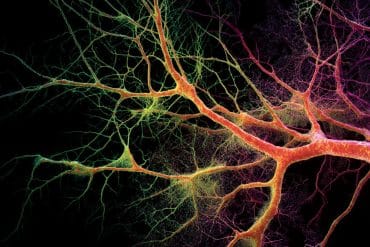Summary: Sound stimulation can manipulate brain waves during REM sleep, a stage crucial for memory and cognition. Using advanced technology, researchers were able to increase the frequency of brain oscillations that slow down in dementia patients, potentially improving memory functions.
The non-invasive technique could pave the way for innovative treatments for dementia by targeting brain activity during sleep. This approach offers hope for enhancing memory and cognition with minimal disruption to patients’ lives.
Key Facts:
- Sound stimulation increases brain wave frequency during REM sleep.
- REM sleep is linked to memory and cognitive functions, which slow in dementia.
- This non-invasive technique could lead to new dementia treatments.
Source: University of Surrey
Brain waves can be manipulated whilst in rapid eye movement (REM) sleep, a sleep stage associated with memory and cognition, a new study from the University of Surrey finds. Novel technology, using sound stimulation, allows scientists to speed up brain activity which becomes slower in patients with dementia during this sleep stage.
During this unique study, Surrey scientists in collaboration with the UK Dementia Research Institute Centre for Care Research and Technology at Imperial College London, used a recently developed technology, closed-loop auditory stimulation, which targets brain oscillations during sleep in a precise way.

With this technology, sounds are timed to hit brain waves at particular parts (e.g. waxing and waning phase) of the oscillation. Sounds were administered accurately with a speed of six (targeting theta waves) or ten (targeting alpha waves) times per second. For the first time, this was done during the REM period of sleep when brain activity is similar to wakefulness, but movement is inhibited.
Dr Valeria Jaramillo, Swiss National Science Foundation postdoctoral fellow at the Surrey Sleep Research Centre and School of Psychology both at the University of Surrey, Emerging Leader at the UK Dementia Research Institute and first author of the publication said:
“Brain oscillations assist in the working of the brain and how it learns and retains information. Brain oscillations during REM sleep have been implicated in memory functions – however, their exact role remains largely unclear.
In dementia, brain activity during REM sleep becomes slower, which is associated with a reduction in the ability to remember certain life events and retain information.
“Stimulating brain waves with sound can increase their frequency and this can help to better understand how brain oscillations in REM sleep promote cognition and how REM sleep can be improved in those with dementia.”
To investigate the effect of stimulation,18 participants were recruited and were monitored overnight at the Surrey Sleep Research Centre. Their sleep was continuously monitored via electrodes placed on their scalp, and the brain oscillations were analysed in real-time so that auditory stimuli could be administered at precise parts of the oscillations without waking participants.
Depending on which part of the cycle was targeted by the auditory stimuli, oscillations became either faster or slower demonstrating that brain waves can be manipulated.
Professor Derk-Jan Dijk, Director of the Surrey Sleep Research Centre at the University of Surrey, UK Dementia Research Institute Group Leader and senior author of the publication, said:
“This could pave the way for a new approach on how to treat patients with dementia, as the technique is non-invasive and undertaken whilst they are asleep, lessening the disruption to their lives and enabling us to be more targeted in our approach.”
Dr Ines Violante, Senior Lecturer in Psychological Neuroscience at the University of Surrey and senior author of the publication, said:
“Using sound stimulation to change brain oscillations whilst a person sleeps shows therapeutic promise. There is currently no cure for dementia, only medication that can slow down disease progression or temporarily help a person with their symptoms, so it is important that we think innovatively to develop new treatment options.
“Sound stimulation, which is a non-invasive inexpensive technique, has the potential to do just this.”
About this sleep and neuroscience research news
Author: Natasha Meredith
Source: University of Surrey
Contact: Natasha Meredith – University of Surrey
Image: The image is credited to Neuroscience News
Original Research: Open access.
“Closed-loop auditory stimulation targeting alpha and theta oscillations during REM sleep induces phase-dependent power and frequency changes” by Ines Violante et al. Sleep
Abstract
Closed-loop auditory stimulation targeting alpha and theta oscillations during REM sleep induces phase-dependent power and frequency changes
Study objectives
Alpha and theta oscillations characterize the waking human electroencephalogram (EEG) and can be modulated by closed-loop auditory stimulation (CLAS). These oscillations also occur during rapid eye movement (REM) sleep, but their function here remains elusive. CLAS represents a promising tool to pinpoint how these brain oscillations contribute to brain function in humans. Here we investigate whether CLAS can modulate alpha and theta oscillations during REM sleep in a phase-dependent manner.
Methods
We recorded high-density EEG during an extended overnight sleep period in 18 healthy young adults. Auditory stimulation was delivered during both phasic and tonic REM sleep in alternating 6 s ON and 6 s OFF windows. During the ON windows, stimuli were phase-locked to four orthogonal phases of ongoing alpha or theta oscillations detected in a frontal electrode.
Results
The phases of ongoing alpha and theta oscillations were targeted with high accuracy during REM sleep. Alpha and theta CLAS induced phase-dependent changes in power and frequency at the target location. Frequency-specific effects were observed for alpha trough (speeding up) and rising (slowing down) and theta trough (speeding up) conditions. CLAS-induced phase-dependent changes were observed during both REM sleep substages, even though auditory evoked potentials were very much reduced in phasic compared to tonic REM sleep.
Conclusions
This study provides evidence that faster REM sleep rhythms can be modulated by CLAS in a phase-dependent manner. This offers a new approach to investigate how modulation of REM sleep oscillations affects the contribution of this vigilance state to brain function.






